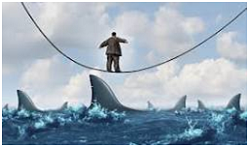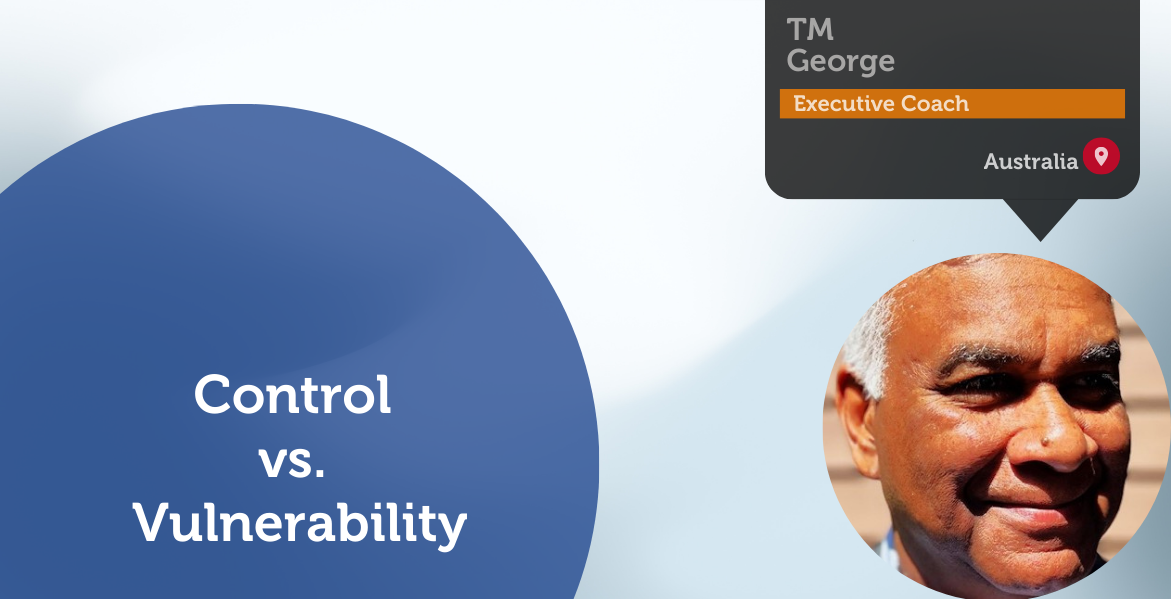A Coaching Power Tool By TM George, Executive Coach, AUSTRALIA
 |
Control vs. Vulnerability |
 |
You can only go into the unknown when you have made friends with yourself. —Pema Chödrön
During the early phase of my corporate life, leaders like Jack Welch (the legendary CEO of GE) were the role models. Leaders like Jack Welch and many others (Bill Gates, Elon Musk, Jeff Bezos, etc) were seen as tough, ruthless, and driven. Having the ability to control their subordinates and environment was key for success and power. Being vulnerable or expressing of emotions of one’s feelings was seen as a sign of weakness.
Control vs. Vulnerability Definition
Many executives still believe that they need to control to be successful. According to Cambridge Dictionary, control means to order, limit or rule something, or someone’s actions or behavior. For these executives, the ability to rule and regulate others to have a restraining or directing influence on others are important competency that may help them climb the corporate ladder.
There has been a huge shift in the perspective over the last few years influenced by factors such as the great resignation, growth mindset, aspirations of millennials to align their work with purpose and values, ability to work from anywhere, etc. ESG metrics (Environmental, social, and corporate governance) are now a key driver of corporate performance benchmarks and now there is much more focus on diversity and inclusion, psychological safety, and employee well-being. Progressive companies not only measure these important employee engagement indicators but also put in place programs and policies aimed at promoting well-being. Leaders who are authentic are seen as more credible and trustworthy. Microsoft is now a leader in the practice of Growth Mindset. Amazon has invested in establishing principles for decision-making aimed at reinforcing agility and team effectiveness. While GE has seen its market capitalization tank over the past few years, its leadership and management education practices are seen as best in class with a lot of focus on behavioral anchors and authentic leadership. As per the research by Khalifian and Berry, being vulnerable is important for establishing strong relationships with teams and promoting a culture that fosters psychological safety.
Given this context, it will be helpful to support our executive clients to understand and appreciate the value of vulnerability. In her book, Daring Greatly, Brene Brown defines vulnerability as uncertainty, risk, and emotional exposure. His research has established that while vulnerability can be at the core of shame, fear, and the struggle for worthiness, it is also seen as important for creativity, joy, and belonging. Instead of being a problem, vulnerability can be a solution. She emphasizes that vulnerability is not weakness, but rather our most accurate measurement of courage. Her research has shown that leaders who are willing to be vulnerable and take risks are more likely to build trusting relationships, promote innovation, and foster a culture of growth and creativity.
According to the Buddhist author, Prema Chodron, vulnerability is definitely in that category of things that, if we move toward them, they have so much to teach us. And if we hide from them, it’s actually hiding from a whole aspect of life, which is important. Part of human life is this vulnerability.
Control vs. Vulnerability Application for Coaching:
Insights related to the client’s mindset and beliefs are generally uncovered during the coaching conversations. If the client can benefit from a shift in their mindset, and beliefs and is supported to develop the perspective and skills that may help them to be more authentic executives, there is indeed an opportunity to explore the topic in greater depth with them. Some of the frameworks that may be helpful include:
- Can they start by asking the “Are you OK” question during 1:1 and team meetings and signally to all team members that it is a safe place to share their problems and worries?
- What are the forums where the client can be honest and authentic with their team about their own challenges and problems? Is there someone in the team who can help and what is required for the client to feel comfortable to ask for help?
- Exploring opportunities for the client to be honest and authentic with their teams. Understanding what is holding them back and helping them develop strategies to be more authentic. Is there a need for them to share about their personal struggles at home or is there a need for them to ask help from one of their team members?
- Being aware of their own emotions is one of the essentials for being emotionally intelligent. So, how can being “vulnerable” based on awareness of one’s own emotions be positioned as a strength rather than a weakness?
- How can the client help shape the culture of their team wherein everyone feels psychologically safe to express their feelings and views?
- Can the client be encouraged to admit their mistakes and failures? According to Patrick Lencioni (Author of The Five Dysfunctions of a Team: A Leadership Fable), leaders who admit their mistakes and are vulnerable are more likely to create a psychologically safe environment where team members feel comfortable sharing their own challenges and learning from each other’s experiences. This in turn results in a higher level of team morale and success.
- Helping clients build trust with their teams will result in transformational changes to their well-being and effectiveness. According to Daniel Goleman, “There is virtually no relationship between being an expert and being seen as someone people can trust with their secrets, doubts, and vulnerabilities. A petty office tyrant or micromanager may be high on expertise, but will be so low on trust that it will undermine their ability to manage, and effectively exclude them from informal networks.” Being vulnerable by sharing one’s emotions is very helpful in building trust (along with other actions such as honoring commitments)
- How can we help our clients to accept themselves and others without harsh judgments?
- According to New York Times best-selling author, Gabby Bernstein, shifting your expectation of your team from a 100% perfect to 85% perfect mindset will help to provide the team with room to grow. Can we help the client to understand that this may help to reduce their own frustrations and stress?
- Letting go of control means less micro-managing. Is this something that the client can benefit from?
References
Janice Omadeke – The best leaders aren’t afraid to be vulnerable – Harvard Business Review
Brene Brown – How the Courage to Be Vulnerable Transforms the Way We Live, Love, Parent and Lead, Daring Greatly
Patrick Lencioni –The Five Dysfunctions of a Team: A Leadership Fable
Mark Bonchek – How Leaders Can Let Go Without Losing Control, Harvard Business Review
Dr Daniel Goleman, Emotional Intelligence.
Gabby Bernstein on how to thrive by letting go of control as a leader – CEO Magazine
Pema Chodron and Tim Olmsteg – Living with Vulnerability
